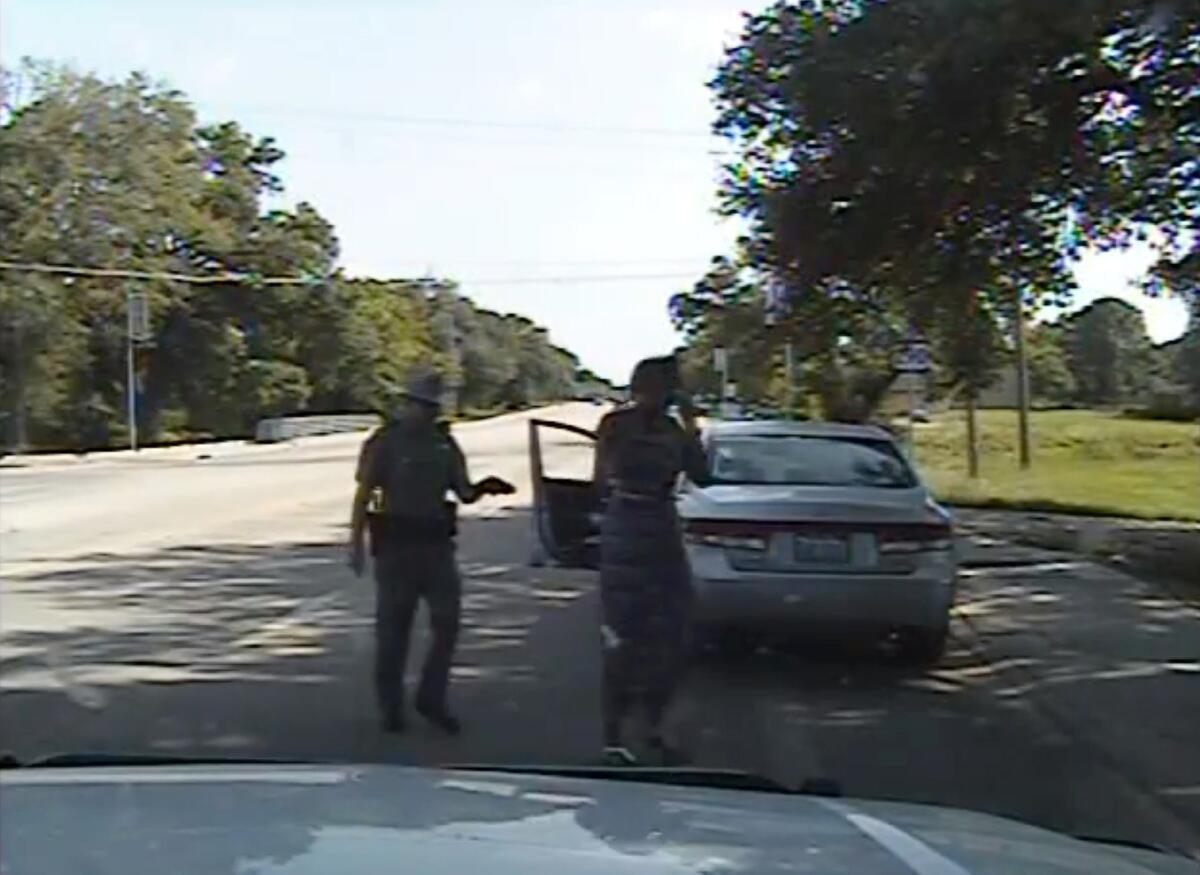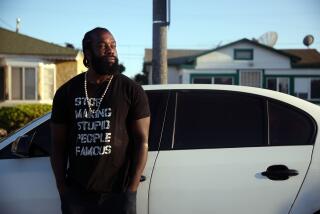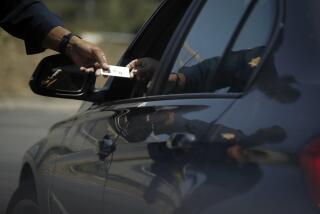Op-Ed: For a safer America, curtail traffic stops

A still frame from a dashcam video provided by the Texas Department of Public Safety shows trooper Brian Encinia arresting Sandra Bland after a traffic stop on July 10 in Waller County, Texas.
In one video after another this year, we’ve seen police stops of African American drivers go violently, terribly wrong. Think of Walter Scott, killed by a police officer in North Charleston, S.C., after a traffic stop for a broken tail light. Or Sandra Bland, pulled over for failure to signal a lane change, and after a confrontation with a Texas state trooper, hauled off to jail, where she died. Or Samuel Dubose, fatally shot by a University of Cincinnati police officer after being pulled over for a missing license tag.
They should never have been stopped by police at all. Nor should the vast majority of Americans pulled over in our national ritual of the traffic stop.
In a unanimous but highly regrettable 1996 decision, Whren vs. United States, the Supreme Court held that any traffic infraction can justify a police stop, even if the officer’s actual motive is “pretextual” — that is to say, the officer really wants to search for drugs and weapons in the car because of the “profile” of the driver. Given the countless violations all drivers commit daily — exceeding the speed limit, staying too long in the passing lane, following too closely — the effect of Whren is that police are almost completely shielded from legal review of their decision to stop a driver.
But minor traffic violations, by definition, pose no significant immediate threat and represent only a marginal increase in risk to road safety. On the other hand, every stop brings a substantial danger to the law enforcement officer: Car and motorcycle accidents and being struck by vehicles are a leading cause of death in the line of duty. Stops also produce a significant risk of escalation and confrontation, with tragic outcomes.
We do not need to accept the traffic stop as the price of public safety. I have driven many miles in other countries, and I have never seen a traffic stop of the sort that I witness nearly daily in California. While precise data are difficult to secure, Americans experience police traffic stops at a rate of about 9,900 per 100,000 citizens, according to a Justice Department survey. By contrast, government reports in England and Wales show traffic stops occur at a rate of only about 2,200 per 100,000; and in France, 2,760 per 100,000. My calculations for Spain, based on its raw number of citations, is about 3,000 per 100,000.
The remarkable fact is that fewer traffic stops do not result in more fatal accidents, according to World Health Organization data. The above-mentioned countries, which have aggressive driving cultures, have 40% to 60% of the U.S. fatal accident rate, despite traffic stops being made 20% to 30% as often.
One reason for this divergence is that these countries, like many others, enforce their speeding laws primarily through radar systems that automatically generate tickets. Red-light cameras also account for a significant proportion of fines. The benefit of camera systems is not only that they permit more extensive enforcement of laws against genuinely dangerous driving behavior, but they do so without racial bias. No camera has ever Tased or shot an unarmed driver.
Americans, both politically progressive and conservative, are coming to realize that aspects of our criminal justice policies put us out of step with the developed nations we regard as peers, from our apparent tolerance of rampage shootings to our system of mass incarceration. Traffic stops too are more typically associated with countries with notoriously corrupt police forces, where they are the pretext for a shakedown.
Indeed, the Department of Justice’s report on the police department in Ferguson, Mo., made clear that traffic stops were used primarily as a means of milking minority drivers (who are less likely to contest their citations) for traffic fines.
So no legitimate concern with road safety compels us to continue with the traffic stop, even if it is legally permissible. Any municipal police chief can simply undertake a quiet, and easily reversible, experiment: Reserve the traffic stop for objectively and imminently dangerous road behaviors, and observe the effects on crime rates and traffic accidents. Local, state and federal government also could encourage the use of red-light and speed cameras, which would surely issue as many or more tickets as traffic patrol officers.
Any purported benefit of frequent traffic stops — for example the slim chance of apprehending wanted criminals — has to be set off against the resentment they engender.
Curtailing traffic stops wouldn’t solve the problem of police violence against blacks and Latinos, but it would reduce exposure to “driving while black” harassment and the collateral harms of the legal process. Police could concentrate their efforts on serious crime and immediate safety risks while traffic engineers implemented alternative ways to improve road safety. And all citizens could enjoy more freedom from overzealous and unproductive policing.
Christopher Kutz is a professor of law in the Jurisprudence and Social Policy Program at UC Berkeley Law School.
Follow the Opinion section on Twitter @latimesopinion and Facebook
More to Read
A cure for the common opinion
Get thought-provoking perspectives with our weekly newsletter.
You may occasionally receive promotional content from the Los Angeles Times.










